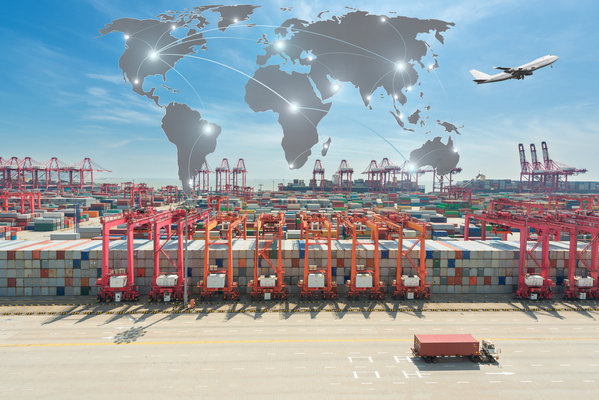แม้ว่าจะเข้าสู่ปีที่สองของวิกฤตการณ์โรคระบาดแล้ว แต่คนจำนวนไม่น้อยกลับเชื่อว่าห่วงโซ่อุปทานทั่วโลกจะยังคงได้รับผลกระทบจาก เชื้อไวรัส COVID-19 อย่างต่อเนื่องเป็นเวลาอีกหลายเดือนหรือเป็นปี อย่างไรก็ดีรายงานจาก KPMG ได้ชี้ให้เห็นว่าการระบาดของเชื้อไวรัสในครั้งนี้ ได้เปิดเผยจุดอ่อนที่ซุกซ่อนอยู่ในองค์กร เช่น มีข้อมูลที่จำเป็นต่อการดำเนินกิจการ และการจัดการความเสี่ยงไม่เพียงพอ และขาดความคล่องตัวในระดับโครงสร้าง ไม่มีอะไรที่เหมาะไปว่าช่วงเวลานี้แล้ว ที่ธุรกิจจะหันมาใส่ใจให้ความสำคัญกับปรับปรุงงานห่วงโซ่อุปทาน

Source: International Economics Consulting
ล่าสุด คือการแพร่ระบาดในบางพื้นในจีน จนกระทบเซี่ยงไฮ้ จี๋หลิน และกวางโจวอย่างหนัก ข้อมูล ณ เดือนพฤษภาคม 2022 มีตัวเลขผู้ติดเชื้อที่ยืนยันแล้วถึง 7,568 ราย และที่เป็นพาหะไม่แสดงอาการอีก 1,603 ราย ณ ปัจจุบัน สถานการณ์การแพร่ระบาดในจีนยังคงดำเนินต่อไปอย่างเลวร้าย และจากที่หลายมณฑลบังคับมาตรการป้องกันควบคุมโรคอย่างเข้มข้น งานจึงเข้าอุตสาหกรรมโลจิสติกส์และขนส่งอย่างหนักสุดๆ ข้อมูลของ Wind รายงานดัชนีความเชื่อมั่นด้านโลจิสติกส์ (LSI) ของจีนว่าอยู่ที่ระดับต่ำสุดเป็นประวัติการณ์ เดือนเมษายน 2022 แตะ 43.8% ลดลง 4.9% จากเดือนก่อนหน้า ซึ่งเป็นจุดต่ำสุดนับตั้งแต่มีนาคม 2020

Source: Research Monthly Outlook and Perspectives Issue 74, Deloitte
ผลการศึกษาของ McKinsey Global Institute (MGI) ชี้ว่าภาวะโรคระบาดที่กำลังเกิดขึ้นอยู่ ณ ปัจจุบัน ได้สร้างความวุ่นวายอย่างรุนแรงที่สุดที่ต่อห่วงโซ่คุณค่า สร้างความเสียหายนับเป็นเม็ดเงินจำนวนไม่น้อยเลย ผลการวิเคราะห์ของ MGI ได้ส่งคำเตือนถึงบริษัทห้างร้านต่าง ๆ ให้เตรียมใจไว้เลยว่าจะธุรกิจจะประสบกับภาวะขาลงประมาณ 7% โดยเฉลี่ยเป็นเวลา 10 ปี

Source: Risk, resilience, and rebalancing in global revenue chain, McKinsey Global Institute (MGI)
ภาวะช็อคไม่ทันตั้งตัวรับสถานการณ์ฯ ผนวกเข้ากับจุดอ่อนที่มีอยู่เดิม จะนำพาผลพวงอันมิพึงปรารถนามาสู่บริษัท แม้การใช้มาตรการปิดเมืองและกักตัวในบ้านจะมีความจำก็ตาม แต่ก็ส่งผลชะงักงันในภาคการผลิต ประชากรรายได้ตกต่ำและใช้จ่ายอย่างระมัดระวังมากขึ้น ส่งผลกระทบรุนแรงต่อเศรษฐกิจ ส่งต่อข้ามไปยังภาคอุตสาหกรรมโดยถ้วนทั่ว ผลกระทบที่เกิดต่อบางภาคอุตสาหกรรมไม่ได้มาจากภาวะชะงักงันของห่วงโซ่อุปทานแต่เกิดจากภาวะล่มสลายของอุปสงค์ McKinsey Global Institute (MGI) ได้กล่าวว่าแม้ตัวเลขความสูญเสียทางเศรษฐกิจยอดรวมจะยังไม่เป็นที่ทราบแน่ชัด แต่จะลุกลามเป็นมูลค่าความเสียหายถึงหลายสิบล้านล้านดอลลาร์ก็เป็นไปได้

Source: Risk, resilience, and rebalancing in global revenue chain, McKinsey Global Institute (MGI)
MGI วิเคราะห์ห่วงโซ่คุณค่าของ 23 อุตสาหกรรมเพื่อประเมินภาวะสุ่มเสี่ยง ดัชนีผลลัพธ์คำนวณขึ้นจากหลายปัจจัย ตัวอย่างเช่น คลื่นความร้อนส่งผลกระทบรุนแรงต่อบางภูมิภาค ห่วงโซ่คุณค่าที่ในอุตสาหกรรมใช้แรงงานมากก็จะมีความเสี่ยงค่อนข้างสูง และหากยิ่งต้องทำงานในสภาพแวดล้อมที่ไม่ได้ควบคุมได้ (งานนอกอาคารสถานที่) ก็จะเผชิญกับความเสี่ยงสูงที่สุด

Source: Risk, resilience, and rebalancing in global revenue chain, McKinsey Global Institute (MGI)

Source: Risk, resilience, and rebalancing in global revenue chain, McKinsey Global Institute (MGI)
ดังที่ Deloitte ได้แนะนำไว้ว่าห่วงโซ่อุปทานจะประสบความสำเร็จมากที่สุดในยุคโลกหลังโควิด จะต้องรักษาสมดุล 3 ประการ ซึ่งได้แก่ ความคล่องตัว ประสิทธิภาพ และความยืดหยุ่น จริงอยู่ว่าค่าใช้จ่ายเพื่อการลงทุนนั้นน่าหนักใจ แต่ในช่วงสองปีที่ผ่านมาทำให้รู้ว่าช่องโหว่ต่าง ๆ นั้นสาหัสกว่า ความคล่องตัวคือหนทางเปลี่ยนวิกฤตเป็นโอกาส กระบวนท่าทางธุรกิจใหม่เกิดขึ้นเสมอ ดังนั้นบริษัทที่สามารถคาดการณ์แนวทางใหม่เหล่านี้ตอบสนองได้ไว้จะสามารถสร้างธุรกิจใหม่ เข้าสู่ตลาดใหม่ และสร้างความได้เปรียบจากแหล่งอุปทานใหม่ แม้ความคล่องตัวดังที่กล่าวมานี้เกิดขึ้นได้แต่ต้องอาศัยชุดความคิดและแนวทางใหม่ตลอดเวลา แต่ก็คุ้มค่าเพราะสร้างความได้เรียบเหนือการแข่งขันอย่างเป็นกอบเป็นกำ

Article by: Asst. Prof. Suwan Juntiwasarakij, Ph.D., Senior Editor and MEGA Tech












